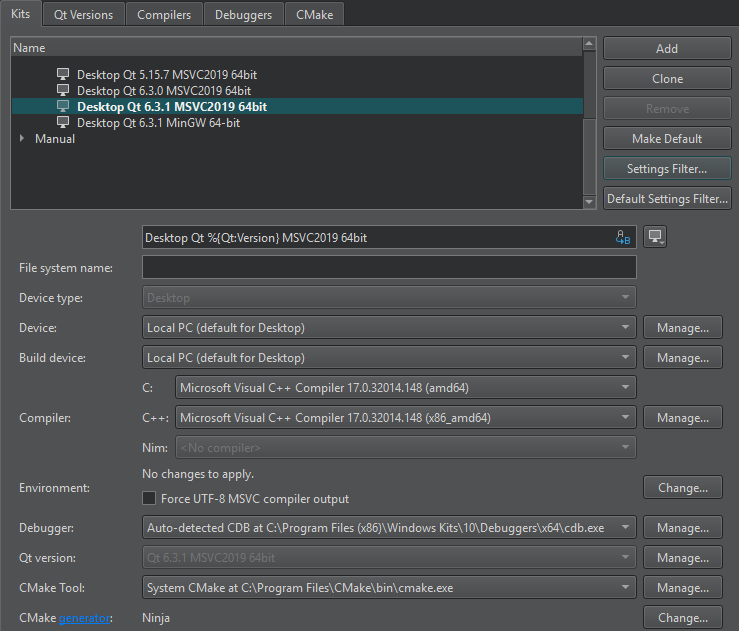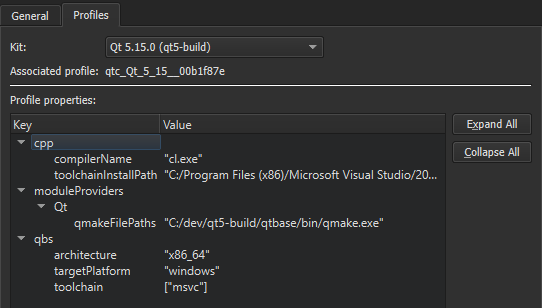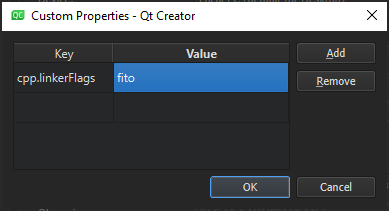No valid kits found qt linux
Hello I am new to Qt and programming. In class we’re were told to use Qt Creator, but I cannot create a project, because the program tells me that «there were no valid kits found». I am using version 4.4.1.
I am probably missing something, also I have seen that other people in class, when installing the program could choose which libraries, compilers etc. they wanted to add, but I didn’t have that option during the installation. Also, the size of the download was, at least so I was told, around 30GB while mine had a size of 700 MB.
Do I have to manually add the kits and if thet’s the case how do I do this?
As you can probably tell by now I really am completely new to not just Qt, but this kind of thing in general.
I hope that someone can help me since I have no clue how to solve this (probably simple) problem.
Hi and welcome to devnet forum
Please share the selection list of your Qt install.
Did you use the online installer?
What operation system are using?
It looks like you have deselected all components and only Qt creator is installed.
Hi.First, thanks for the quick reply.
I am using Windows 10 as OS.
And yes I used the online installer. Though I do not know exactly what I selected during the installation. I just accepted the default settings. If it is as you say and I somehow deselected all the components, how do I (re-)install them?
Best is to restart the MaintenanceTool.exe and use the first option
like here: 
Here is an example of what I have installed.
For starting you need at least one version of Qt libs (e.g. Qt 5.9.2).
Either you load all, which is quite a bit or you should load / check
This installs the MinGW pre-build and you need also to check the appropriate compiler under tools. The compiler for the pre-build is for Qt 5.9.2 MinGW 5.3.0 . If you like to install another MinGW pre-build, you need this compiler as well.
You could use also the MSVC201* versions, but there you need to install the MSVC201* compiler version,which you have to purchase or to install the respective community version.
As you see I am working with MinGW, which is fine. From my point of view no need to go for MSVC versions.
Where in the Qt-Folder can I find the MaintenanceTool.exe? Or is it in a seperate folder?
Nevermind, problem solved. Thanks for the immediate response. You really saved me.
I found MaintenanceTool.exe installed in C:\Qt . I didn’t know it existed until I found this bug report via https://bugreports.qt.io/browse/QTIFW-1125?jql=text
«qt creator install can’t add kit» while beginning to create my own report.
It would be helpful and reduce a lot of confusion if a Start Menu link to this tool was created adjacent to Qt Creator. (I suggest a name like Qt Update Tool )
Hi and welcome to devnet forum
This is only a user’s forum. Nobody is monitring for bug reports and implementation suggestions. You would need to make an input to JIRA which is the offical bug tracker for Qt and all tools. You may use your account credentials also there.
Источник
No valid kits found qt linux
First of all check whether is there any kit configured in your QT your not by going into Tools -> Options -> Kits. Like below image.
please, run your ‘qt maintenance tool.app’ in your qt folder.
and you should check your option like ‘5.12.4->msvc2017’ or ‘5.12.4->clang++’.
if you have any compiler / toolchain kit, you cannot select in the ‘kit selection’.
@ankit-thakar 
this is what i have
@aranjit What kind of project are you trying to create?
@jsulm Just trying to create a simple calculator
@aranjit
Hi
I think @jsulm meant more like
What platform are you aiming for ?
a Android app or iOs or linux Desktop etc ?
Your kit seems a bit odd so are you trying to do cross-compiling or anything like that ?
What platform are you on ?
Its it macOs?
How did you install Qt ?
What packets did you select ?
If MacOs, did you also install XCode etc ?
@aranjit :- I actually faced same kind of problem in one of my colleague’s machine.
What I observed in his machine is that he didn’t configured any Qt versions.
So, can you please check that if you have the same problem or not?
i.e. goto Tools -> Options -> Kits -> Qt versions .
This happend for me because during the install on the versions page there is a tickbox stating (Use latest releases) as this seemed like a reasonable default I proceeded. This actually installed no Qt versions. So there were no kits installed. Hence this error during first use.
The problem is due to not making a selection in the list on the right, and can be remediend by running (Mac OS)
Источник
No valid kits found qt linux
Hello,
I work under Fedora 28 server x86_64, I installed Qt, with this command line:
dnf install qt-devel qt-doc qt-creator.
But when I make new project empty into Qtcreator 4.6.2 it returns to me:
No valid Kits found .
I had to forget a something but what?
@philo_neo Please check the kits: are there any? If there are kits then check them — do you have any red exclamation marks?
Also, did you install GCC/G++?
with codeblocks i have GCC and LLVM
@philo_neo What about the Kits in QtCreator? CodeBlocks will not help here.
i have this error :
Failed to set up kit for Qbs: Could not determine whether Qt is a static build.
@philo_neo Why do you need Qbs?
maybe it’s error since that i try to inisialyse Qtcreator
the error is in the option == build & Run
@philo_neo Any other errors?
Can you post screen shots of your Kits?
Hello,
I work under Fedora 28 server x86_64, I installed Qt, with this command line:
dnf install qt-devel qt-doc qt-creator.
But when I make new project empty into Qtcreator 4.6.2 it returns to me:
No valid Kits found .
I had to forget a something but what?
Hi,
I’m by no means a linux expert, but when I installed qt via the commandline, instead of the online-installer I had to specifically tell QtCreator the path to the compiler. Everything else was detected automatically.
Don’t have my Linux machine here right now, but this is where the compiler path should be:
Источник
No valid kits found qt linux
I’m trying to open a new project in Qt Creator, and I’m getting a «No valid kits found» error. In options I do see a kit configured.
In Options > Kits I have Desktop (Default) with the following settings:
Name: Desktop
File system name: [empty]
Device type: Desktop
Device: Local PC (default for Desktop)
Sysroot: [empty]
Compiler: GCC (x86 64bit in /usr/bin)
Environment: No changes to apply.
Debugger: System GDB at /usr/bin/qdb
Qt version: Qt 5.2.1 (qt5)
Qt mkspec: [empty]
CMake Tool: [empty]
Hi and welcome to devnet,
Do you have Qt 5.2.1 installed properly ? You can check that in Qt Version
In About I see:
Qt Creator 3.5.1 (opensource)
Based on Qt 5.5.1 (GCC 4.9.1)
Built on Oct 13 2015
In About I see:
Qt Creator 3.5.1 (opensource)
Based on Qt 5.5.1 (GCC 4.9.1)
Built on Oct 13 2015
That is information about Qt Creator; that is not information about your kit.
To find information about your Qt versions, see Tools -> Options -> Build & Run -> Qt Version
In Options > Kits I have Desktop (Default) with the following settings:
Name: Desktop
File system name: [empty]
Device type: Desktop
Device: Local PC (default for Desktop)
Sysroot: [empty]
Compiler: GCC (x86 64bit in /usr/bin)
Environment: No changes to apply.
Debugger: System GDB at /usr/bin/qdb
Qt version: Qt 5.2.1 (qt5)
Qt mkspec: [empty]
CMake Tool: [empty]
Is there a red or yellow warning icon next to this kit?
Источник
Qt Documentation
Contents
Qt Creator groups settings used for building and running projects as kits to make cross-platform and cross-configuration development easier. Each kit consists of a set of values that define one environment, such as a device, compiler, Qt version, and debugger command to use, and some metadata, such as an icon and a name for the kit. Once you have defined kits, you can select them to build and run projects.
Qt Creator supports development for the desktop and for the following types of devices:
Filtering Kit Settings
Typically, only a subset of the kit settings is relevant for a particular setup. Therefore, Qt Creator plugins register sets of relevant settings that you can view and modify in Tools > Options > Kits. For example, if you use CMake to build all your projects, you can hide Qbs and qmake settings by default.
To hide and show settings in the Kits tab for the current kit, select Settings Filter. To view and modify the settings displayed when you add a new kit, select Default Settings Filter.
Specifying Kit Settings
To clone the selected kit, select Clone.
Double-click the icon next to the field to select the image that is displayed in the kit selector for this kit. You can use any image in a supported file format (for example, PNG). The image is scaled to the size 64×64 pixels. For example, using the compiler logo as an icon allows you to easily see, which compiler is used to build the project for the selected kit.
For Android kits, the Android GDB server field will display the path to GDB server executable.
In the Qt version field, select the Qt version to use for building the project. You can add Qt versions to the list if they are installed on the development PC, but were not detected automatically. For more information, see Adding Qt Versions.
Qt Creator checks the directories listed in the PATH environment variable for the qmake executable. If a qmake executable is found, it is referred to as Qt in PATH and selected as the Qt version to use for the Desktop kit that is created by default.
Qt Creator uses the default kit if it does not have enough information to choose the kit to use. To set the selected kit as the default kit, select Make Default.
Editing Qbs Profiles
To view the Qbs profile associated with the kit, select Tools > Options > Qbs > Profiles.
You can add keys and values to the profile or remove them from it, as well as modify existing values. For a list of available keys and values, see List of Modules in the Qbs Manual.
To edit the Qbs profile associated with the kit:
- Select Change next to the Additional Qbs Profile Settings field to open the Custom Properties dialog.
Double-click an empty cell in the Key column to specify the key to add or modify as: .
.
To modify an existing value, double-click it in the Value field.
To remove the selected property, select Remove.
В© 2021 The Qt Company Ltd. Documentation contributions included herein are the copyrights of their respective owners. The documentation provided herein is licensed under the terms of the GNU Free Documentation License version 1.3 as published by the Free Software Foundation. Qt and respective logos are trademarks of The Qt Company Ltd in Finland and/or other countries worldwide. All other trademarks are property of their respective owners.
Источник
















